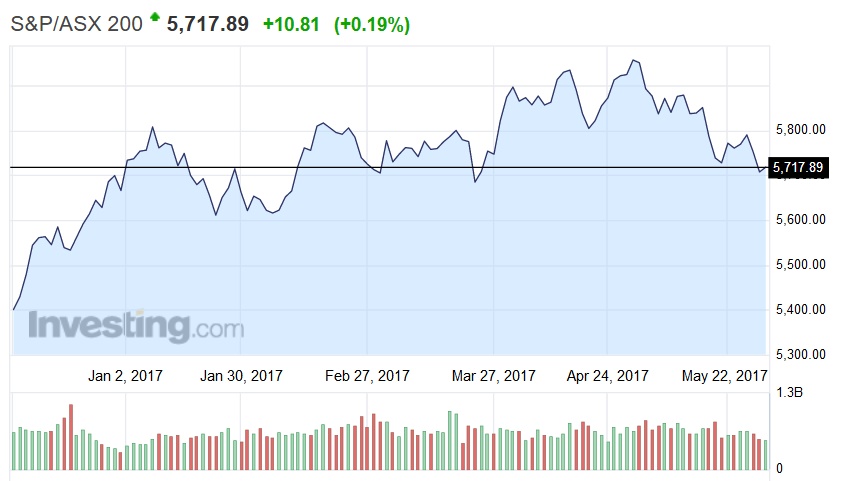A veteran stock-picker’s shock decision to sell out of the share market entirely and return millions in cash to investors could trigger the very “calamity” he fears, according to experts.
Philip Parker, head of Altair Asset Management, announced in an open letter on Monday that he has given up on picking the market for the next six to 12 months because share and property prices will soon collapse.
It has triggered widespread speculation in the industry. Is it a publicity stunt or a prescient warning?
Many have pointed to the latest CoreLogic figures for May, which showed a drop in Melbourne and Sydney dwelling prices, to say the fund manager is onto something.
Preliminary figures from the property researcher showed dwelling values in Sydney fell 1.3 per cent and 1.8 per cent in Melbourne in the first 29 days of May.
Prices in Perth fell 0.6 per cent, while Brisbane was up 0.8 per cent and Adelaide prices increased by 0.5 per cent.
CoreLogic acknowledged that prices normally fall or moderate in April and May, but it attributed this result to banking regulator APRA’s crackdown on investor lending.
Last month, Sydney’s red-hot market showed early signs of cooling, with dwelling values inching down 0.04 per cent, while Melbourne values rose but at a slower pace than one month earlier.
Mr Parker, who markets Altair as a “high conviction” fund, wrote that he could not in good conscience keep charging fees “when there are so many early warning lead indicators of clear and present danger”.
“To me there are specific identifiers that are extremely recognisable that remind me of the late eighties and early nineties housing calamity,” he said.
“Giving up management and performance fees and handing back cash from investments managed by us is a seminal decision however preserving client’s assets is what all fund managers should always put before their own interests.”
Martin North, a property market analyst, said the only upside for the Australian economy at the moment is “sentiment and enthusiasm”, and that a shock move like Altair’s could be all it takes to tip the scales.
“Sentiment is crucial, which is why everyone wants to be buoyant and talk positive. There’s no doubt that with the international connectivity of the international markets, sentiment can be amplified and become self-fulfilling,” Mr North told The New Daily.
“If you call it right at the right point, you can make a lot of money. But what’s the collateral damage?”
Despite these concerns, Mr North gave credence to the potential triggers identified by Altair, namely: a property bubble burst in Melbourne and Sydney; a stock market bubble burst Australia-wide; a debt bubble burst in China; and political uncertainty in the US.
However, another property market expert, Dr Nigel Stapledon at the University of New South Wales, said Altair is “entitled to their view, but I don’t share it”.
He agreed that property prices are too high, but he said even if prices in Melbourne and Sydney fall by 10 per cent, Australians will barely notice so long as they are not forced to sell their homes.
If population growth persists, prices will recover, Dr Stapledon told The New Daily.
“Almost every year you have someone predicting Armageddon in the property market. Clearly prices are overpriced. You could easily have a 10 per cent price fall, but I don’t call that Armageddon.”
If the Chinese economy collapses, the Australian economy could enter a recession, and then immigrants might stop flocking here. Then we’d be in real trouble, he said.
“Those are risks. But there are always risks. It’s not clear to me those risks are going to emerge.”


Been reading the US stock market MUST crash for over 5 years now and it just keeps going up but then I see Warren Buffett sitting on US$100 billion and Apple sitting on its US$250 billion and then see this as well as an increasing number of Wall Street types going into hiding and wonder. Paul Singer has either closed or will close soon on owning the LMI companies and given his love of complex deals that take advantage of bankrupt countries I have growing concerns. Add in “Responsible Lending” which to me seem to be responsible for more business closures and bankruptcies. We do live in “interesting times” the Chinese curse type.